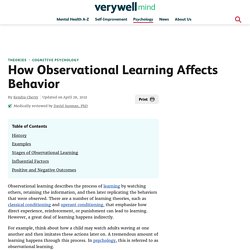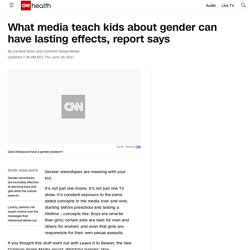

Thereafter, they learn and exhibit these learned attitudes and behaviours. Information & Examples of Observational Learning. Observational learning describes the process of learning by watching others, retaining the information, and then later replicating the behaviors that were observed.

There are a number of learning theories, such as classical conditioning and operant conditioning, that emphasize how direct experience, reinforcement, or punishment can lead to learning. However, a great deal of learning happens indirectly. For example, think about how a child may watch adults waving at one another and then imitates these actions later on. A tremendous amount of learning happens through this process. In psychology, this is referred to as observational learning. Who do the children observe and learn their gender-typed behaviours from? Boys will observe and adopt the gender attitudes and behaviours of their father or brothers. Girls will observe and adopt the gender attitudes and behaviours of their mother or sisters. Children observe and adopt gender-typed behaviours of their same-sex siblings (Rust et al., 2013). Peer influence. What media teach kids about gender can have lasting effects, report says.
Story highlights Gender stereotypes are incredibly effective at teaching boys and girls what the culture expects Luckily, parents can assert control over the messages that Hollywood dishes out Gender stereotypes are messing with your kid.

It’s not just one movie. How does stereotypes in movies and on TV impact gender development? Media that perpetuates rigid gender roles and stereotypes can affect children's sense of self, relationships, and career aspirations.

Our latest research report explores the effects of gender-biased media on children's development so we can promote more positive, accurate gender representations that give kids the freedom they need to be themselves. Sign Up or Sign In to access. Marvel Superhereos. Boys who watch Superhero movies and TV programmes observe and adopt the gender-typed behaviours of the male superhero characters. Disney Princesses. Girls who watch Disney Princesses movies and TV programmes observe and adopt the gender-typed behaviours of the female princess characters. Did Disney shape how you see the world? - BBC Worklife.